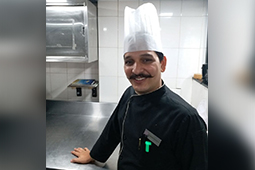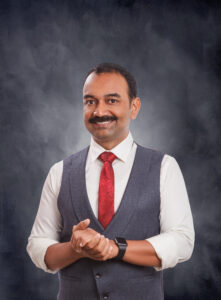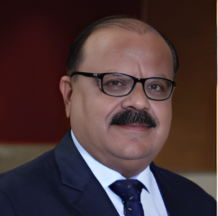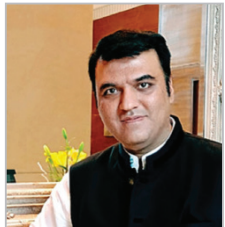Sameer Giri, Chef at ITC Fortune Miramar,Goa

Mr. Sameer Giri, is a 28 year old, young, energetic and highly enthusiastic personality, currently the chef at ITC Fortune Miramar. In the 6 years of duration of his career, he has excelled exceptionally in his field. Speaking to him we get an insight of his experience so far.
Q1. What inspired you to choose this difficult and interesting profession?
No one in my family, for many generations, has been into the hospitality industry. Most of my family members either work for the Indian Army or join Police Service. I grew up helping my mother in the kitchen. When I was in the school, I was very fond of watching the MasterChef Series. That is when I started looking at this field more keenly. I began my experiments, tried learning new recipes and preparing at home. When I reached a point where I had to choose my profession, the hospitality industry came up naturally. From that day onwards, the learning hasn’t stopped.
After my 12th, I learnt about a course for chefs that was conducted by IHM. I joined and got an idea of the skill requirements and prospects in this industry. The course was for about three months, and I realised with a lot of hard work and determination, the future in this profession would be worth it.
Later I joined the Academy for Culinary Education in Cidade De Goa under Chef P.N. Raman, and that is where I truly began my culinary journey.
Q2. What would you recommend the readers and youngsters wishing to get into this profession?
Making a career in any stream needs hard work and determination, and the hotel industry is no different. You have to understand that the first 2-3 years in the hospitality industry are difficult but crucial. It takes perseverance to get through the initial challenges. Later as you gain experience and knowledge, you shall understand the essence of the industry, and you will be ready to begin and genuinely enjoy your profession.
Q3. In your career as a chef what would you say are the biggest challenges you face?
I cannot classify the challenges here. However, one particular experience I would like to mention here. I began my career with Hotel Oberoi at Nariman Point, Mumbai.
Although, later when I joined the Carnival Cruise line where we had to cater about 4000 to 5000 people every day, the transition from providing a very few hundreds to thousands of people was staggering. Firstly, it was a different working atmosphere and managing a large number of people and at the same time working efficiently was challenging.
Q4. What would you suggest to the Junior chefs out there so that they avoid the challenges mentioned by you or make it easier for them to face the same?
All you need to do is keep your focus clear. Every new experience is going to teach something new. Set targets for yourself, and make sure you achieve those at the right times in your life. Say for example, at the age of 30, you want to be at Sous Chef position or Executive Chef level, and then follow your mark. Do everything it takes you to be one step closer to it. Stay motivated, work hard and don’t give up on small challenges you’ll face almost every day.
Q5. What was the key failure in this career and what are the lessons you learnt from this experience?
Fortunately, I cannot call any of my experiences as a failure in my career. As I said previously, there was always something to be learnt out of the mistakes, and the experience gives you the insight to make through it and rectify any errors before things go out of hands.
Q6. What is the key secret to your success?
In one word, HARDWORK.
Q7. What are the basic needs of chefs you believe should be taken care by the management?
I believe management must provide proper accommodation and good food not only to Chefs but to all the employees. Many people in our industry move away from their hometown in hopes of making a career. The happy employee will work more efficiently for the management. Moreover, the employees should also be given set off-days for getting enough rest. I would want you all to know; we work for 12-15 hours straight sometimes.
Q8. What are the basic mistakes that chefs generally make?
Since we work under tremendous pressure, we should not let that affect our proficiency in any way. We need to be clear-headed and focused enough to take proper decisions and be consistent to deliver without compromising the quality and the taste of the food within the given time constraints.
Q9. How do you keep yourself updated with new recipes?
Of course, I have internet and social media to thank for it. I follow many renown Chefs on Facebook and Instagram and read articles from magazines like Upper Crush Magazine. Sometimes we experiment in the kitchen.
Q10. If the authority leaves it up to you, what changes or additions would you like to do in the courses of IHM (Institute of Hotel Management)?
I believe the institutions should focus more on industrial training as what we learn at the college level and what we are expected to do at work; is worlds apart. Basic academic knowledge is essential, yes, but it is the experience that would help the newcomers to get where they want.
Industrial training gives a first-hand experience of how a kitchen works. One year of experience in the kitchen and you do not need measurements to know the quantities or refer to your notes for any recipes or types of cuts and seasonings, etc. it just comes naturally to you.
The teachers also have a crucial role in sculpting the students for their future. I was fortunate to have an experienced and a fantastic person, Chef Raman Ayyar as my mentor. He helped me to cope with any hardships which I dealt with as a student.
Q11. How do you want to put your mark on the history of culinary art and into the hospitality industry?
It is my dream to work with a French Chef and to come up with a restaurant with gastronomical food in Goa, where we keep up with the food processing trends all over and deliver healthy cooking without compromising the taste.
Nowadays food processing methods are ever changing with time. We need to adapt and deliver accordingly. Ex. earlier we used to make Balsamic Caviar food but now we can papaya puree Caviar also. Traditional deep frying or pan frying can be replaced with Sous-Vide cooking that maintains the consistency of the food, keeping the original taste and nutrients intact. For example, we vacuum pack the fish and place it in the pot, and is slow-cooked over a few hours at a constant temperature.
So all these methods for preparation provide healthy food options.
Q12. What else, in your opinion, can be done to enhance the guest’s experience?
Each guest will have different opinions and needs. We need to interact with them and understand their requirements and provide accordingly. If some guests with any health issues or allergies demand any dish with alterations, we need to have the proper replacements of the ingredients ready for any requested customisation.
After serving the food, it is important to go up to them and inquire about any requirements or comments regarding food. It makes them happy that you are genuinely concerned about their needs.












Leave a Comment